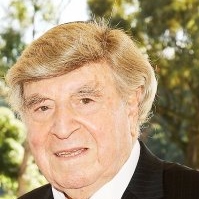click to dowload our latest edition
CLICK HERE TO SUBSCRIBE TO OUR NEWSLETTER


Published
6 years agoon
By
adminSUZANNE BELLING
Speaking at his funeral at West Park Jewish Cemetery, Rabbi Mendel Rabinowitz, of the Greenside Hebrew Congregation, said: “He played a major role in the advancement of medical facilities in South Africa.”
While most were aware of this aspect of his career, not everyone knew he was also a successful property developer and farmer.
Born in 1922 in the shtetl of Rakow – at that time part of Poland, but today, Belarus – he grew up in a rural area. He experienced the scourge of anti-Semitism first hand between the First and Second World Wars.
Most vivid to him from his childhood was the times, usually before Pesach, the locals believed that Christian children were killed, and their blood used for matzah – the blood libel.
They embraced this myth and increased their violence towards the Jewish community. But, despite this, Hurwitz kept going to Hebrew school and contended with being marginalised from economic and social activity and general education.
He was eight years old when he was forced to take a job as a security guard in an apple orchard close to the Polish-Russian border, to make some money. “He never stopped working for 87 years thereafter, right up to the week before his passing,” his grandson, Jarren Hurwitz told the SA Jewish Report.
In 1934, Hurwitz arrived in South Africa by ship. He was 12 years old. As it happens, Leah – who later became his wife of 68 years – was also on the same ship.
When he got here, he could only speak Yiddish, Polish and Hebrew. All his life, he was well known for his love of Yiddish.
In spite of not being able to speak English initially, Hurwitz excelled at his school, Forest Hill High, in Johannesburg. He was made a prefect in matric, but had to decline the position as his family could not afford to pay for the mandatory prefect’s tie.
His ambition was to become a medical doctor, but lack of funds led him to qualify as a pharmacist in 1946. He was registered as a chemist and druggist with the South African Pharmacy Council, prior or establishing his own pharmacy.
However, he studied pharmacology, bacteriology and biochemistry some years later in the United Kingdom.
In 1948, he opened a pharmacy on the corner of High and Bree Streets in Fordsburg. His business acumen came to the fore and his pharmacy became one of the most popular in Johannesburg.
He befriended anti-apartheid activist Yusuf Dadoo. When Dadoo, Nelson Mandela and Ahmed Kathrada, were on the run from the security police, Hurwitz took them in and hid them behind a showcase in his shop, until it was safe to emerge.
When private hospitals were a rarity in the fifties and sixties, Hurwitz saw a gap in this market. He bought the Rand Clinic in Hillbrow. Thus, began the Clinic Holdings Group, now Netcare, with Hurwitz as executive chairman and chief executive officer. It was later listed on the Johannesburg Stock Exchange.
Hurwitz’s hospitals were distinguished by accessibility, the most modern and advanced medical equipment and technology in SA and a concern for staff training and development.
He felt that technology could be best implemented by highly-trained, efficient and motivated nursing staff and he established the St Augustine’s Nurses Training College in Durban.
This served as a fully-fledged training college for nurses and qualifications obtained there were recognised locally and internationally. Similarly, he started a training college in Johannesburg in conjunction with the then Rand Afrikaans University (RAU) where graduates received a university-recognised qualification.
He was awarded two honorary doctorates in 1997 by the University of the Free State and Unisa. He was a director and board member of over 90 national and international companies.
Philanthropically, the Jewish community was close to his heart and millions benefited from his work. He served many terms as chairman of the Emmarentia Hebrew Congregation and remained an active member of Greenside Shul.
“I will miss his face in the shul and his appreciation of the shiurim,” Rabbi Rabinowitz said.
Always cognisant of his Jewish roots, he returned to his home-town in Rakov after the fall of the Iron Curtain the 1990s and restored and preserved the Jewish cemetery, with his “landsman” the late Aaron Grinholz.
Hurwitz leaves his wife, Leah, children Charmian Roffey and Jeffrey and Arlene Hurwitz; grandchildren Justin, Michael, Jordan and Ashley Roffey; and Rabbi Ricki, Shaun, Simeon and Jarren Hurwitz; and great-grandchildren Cole Roffey and Bayla, Eliyahu, Tzophia, Ella, David, Shayna and Asher Hurwitz.

Colin Segal
Oct 31, 2017 at 10:39 am
‘… Truly a giant among men.’